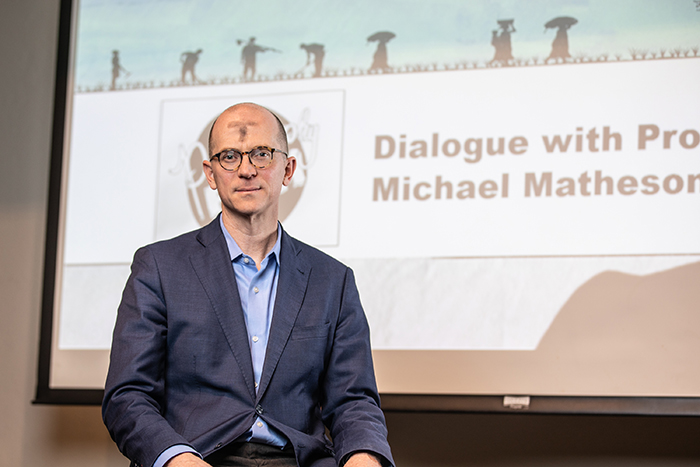
By Lana Sweeten-Shults
Photos by Elizabeth Tinajero
GCU News Bureau
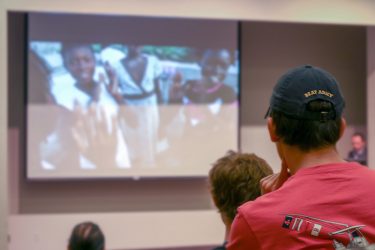
Blake Mycoskie, founder of TOMS Shoes and one of the world’s most visible social entrepreneurs, stepped up in a big way when he vowed to help the poor by doing one simple thing: For every pair of shoes purchased, one new pair would go to a child in need.
It's a good deed that everyone would think leads to a happily ever after.
But if you watch producer-director Michael Matheson Miller’s documentary “Poverty, Inc.,” screened at Grand Canyon University Wednesday, you might not think so.
It’s not a happily ever after for the shoemakers who then can’t make a living. Who wants to buy shoes when they’re trucked in for free?
It might not be a happily ever after, either, for those in need who start to depend on temporary humanitarian relief, rather than long-term solutions, as white truck after white truck rolls in from not just TOMS Shoes but the United Nations and countless nonprofit and church organizations giving away footwear, government-subsidized rice and other forms of humanitarian aid.
The film asks an important question: Is creating a generation of beggars really a step up? And, really, in the multibillion dollar poverty industry, who actually is benefiting?
With this system of social engineering in place -- the new, politically correct word for charity, Miller said -- have these poor countries somehow risen out of poverty?
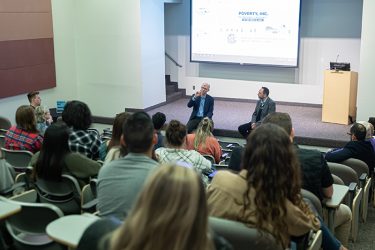
And has Bono and other celebrity activists accomplished their wish of ending poverty?
As Senegalese entrepreneur Magatte Wade, a critic of the current poverty system, says in the documentary, "By now, Bono should know better.”
Over the summer, GCU sent more than a half-dozen full-time faculty members on scholarship to Acton University, an Acton Institute conference whose mantra is “connecting good intentions with sound economic principles.” The institute is a partner of the Kern Foundation, the organization behind the grant that helped the University launch its Barnabas Pastoral Program. The program creates young church leaders by greatly reducing the cost of obtaining bachelor’s and master’s degrees.
“They (the faculty) came back and said the documentary is the best way to start a conversation on campus about the things we learned,” said Dr. Jason Hiles, Dean of the College of Theology.
He said the film, shown in two screenings, one for faculty and staff and the other for students, speaks powerfully to many of the charitable endeavors the University engages in as it lives out its mission as a Christian institution and invests in its community through charitable, good deeds.
“The film overlaps very significantly with what we’re trying to do as a university,” Hiles said. “So when we think about GCU at 35th Avenue and Camelback, and 27th Avenue and Camelback, and we think about the impact we would have in our community, we would want to think very wisely, with sound economics, as we’re trying to help people. That’s exactly what this film is about. So we brought a dialogue partner, a conversation partner, to campus that could help us as a community think more deeply about that.
“We also have a number of students we send out who go to different countries around the world. We want to give them an opportunity to think carefully about what they’re doing and the impact of that, so it was a natural fit when the opportunity arose.”
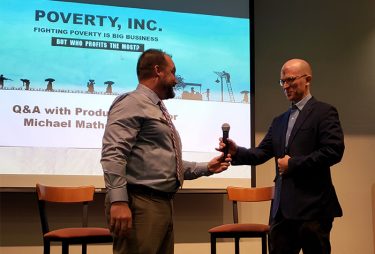
“Poverty, Inc.” has won more than 60 international film festival honors, along with the $100,000 Templeton Freedom Award and the 5,000 euro Best Documentary Award from the FIFE Environmental Film Festival in Paris.
“We wanted to make a film that would engage different people and be able to create a conversation and debate and discussion, and in a highly politicized world, it’s sometimes hard to do that,” said Miller, a research fellow at the Acton Institute.
“This film has been endorsed by free-market economists like Russ Roberts, who runs EconTalk, and non free-market economists like (documentary filmmaker) Michael Moore. They don’t usually agree on many things, so we’re happy about that,” he said with a smile.
Miller pointed out some of the implicit key philosophical elements in the film.
One is that humans are not objects.
“Each of us is a unique, unrepeatable person who is willed for his or her own sake,” he said. “But a lot of the ways that we address poverty with this social engineering model is we turn poor people into objects -- objects of our pity, objects of our charity, objects of our compassion.
“Much of it is well intended, but, nevertheless, it is an objectification of the poor. So that’s kind of the deep underlying element. … Part of what we try to highlight in that film visually in the story itself is that human beings are indeed subjects and, therefore, should be the protagonists of their own development, not the pawns of social engineers. Too often, we’ve used the developing world as a lab for our experiments.”
The second philosophical element is that the documentary is a critique of humanitarianism, which he sees as distinct from Christian charity. Christian love is to seek the good in others and to will the other person’s good.
“Humanitarianism, on the other hand, has this limited horizon. It stops at providing material comfort. The charity world provides material comfort, as well, but ... what’s the purpose of that material comfort for human flourishing and keeping the eternal destiny in mind?”
Miller said the third point of the film is to critique the hubris of social engineering, in which every problem is treated like a technical one and somehow needs a technical solution.
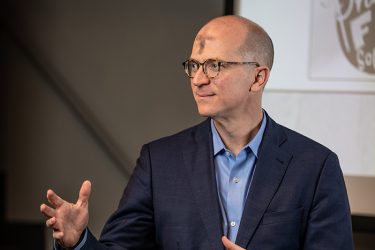
When he spoke of hubris, he gave the example of mission trips – “Who’s the mission trip for? The mission trip is really for our children, not poor people." He also spoke about how wealthy countries deal with orphaned children.
“Eighty percent of Haitian orphans actually have one parent. Imagine if (people from other countries) said, look, I know you’re struggling, you’re raising your children, things are really hard … why don’t you let me adopt your children? Let me raise them for you.”
Americans, he said, would be appalled if someone said the same to them. “Yet this is the kind of stuff we do to poor people," Miller said.
He shared with the audience that the fundamental question we should be asking is not what causes poverty but what causes wealth.
One audience member asked why Miller said earlier in his talk that Michael Moore might not have engaged with this film if it were made for a Christian audience rather than a general audience.
The director shared how he wanted to make a film about poverty and humanitarianism that would apply to everyone (a separate DVD, “PovertyCure,” he made with Christian audiences in mind).
“Most of the people watching (‘Poverty, Inc.’) probably don’t have faith commitments, but we wanted to critique the United Nations, The World Bank. We wanted to critique the foreign aid establishment, the celebrity culture and social entrepreneurs. You know how many Christians are giddy over TOMS Shoes? So by us critiquing TOMS Shoes, we’re able to hit both sectors,” he said.
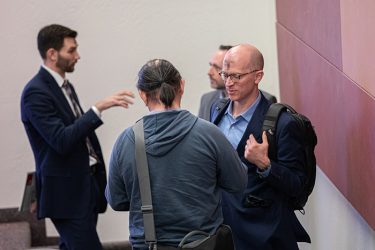
“That was a very eye-opening film. Thank you for bringing it to us," one audience member said in the faculty Q&A session. "I think a group of us left, going, ‘Oh gosh, I’ve been doing a lot of damage.'”
Her family is involved in community work, she said, and wanted to know how to talk to her children because there likely will be a big shift in her family. “My kids are constantly wanting to 'do,' but we assumed we were helping.”
Miller pondered her question, then he spoke of the humility in what she was saying, rather than hubris -- which is what we should aspire to have.
“It’s great that your children want to do things. Part of what you’re doing now is you’re learning and that you temper, in a very positive way, the activist nature and turn your action into caritas, actually lived-out charity, and that is through habits of prayer and talking and thinking and analyzing our motivations so that we don’t make ourselves the hero or the protagonist," Miller said. "... And the last thing I would say is, very obvious: Do unto others as you would want them to do unto you if you were poor.”
GCU Senior Writer Lana Sweeten-Shults can be reached at [email protected] or at 602-639-7901.
***
Related content:



































































